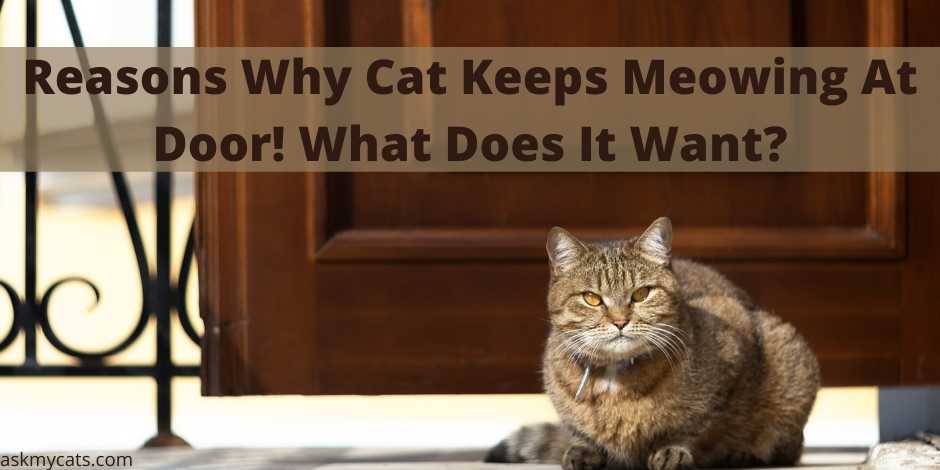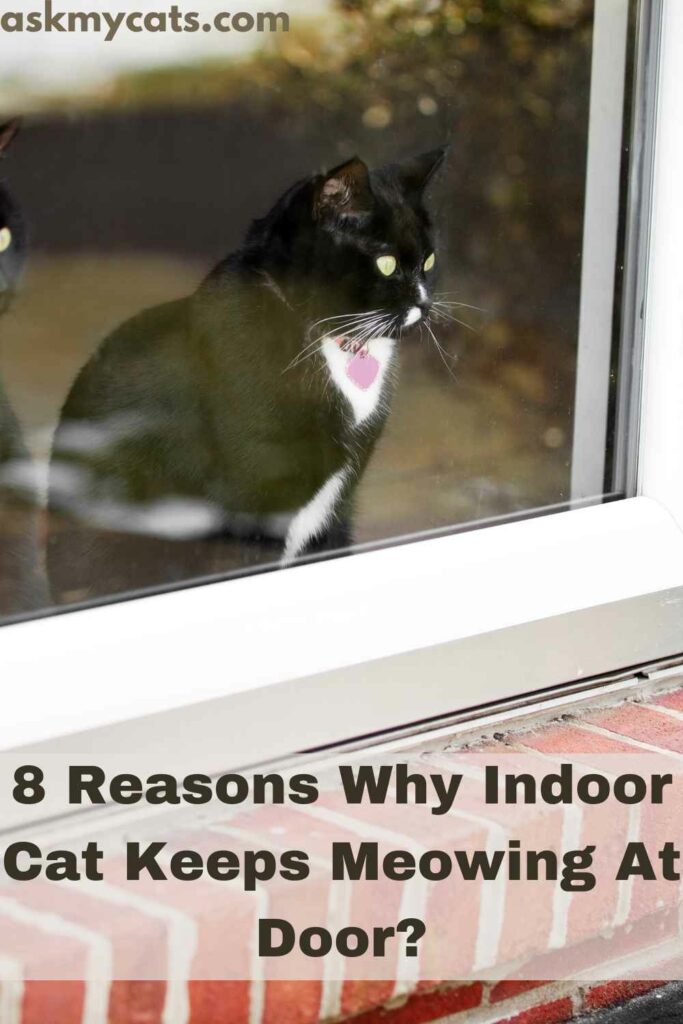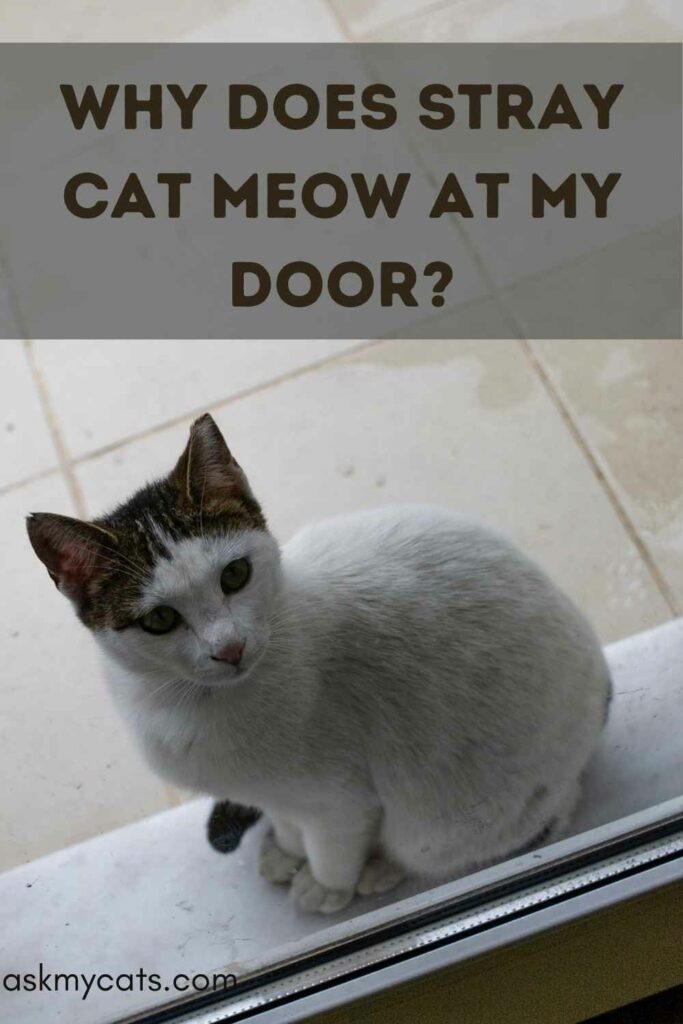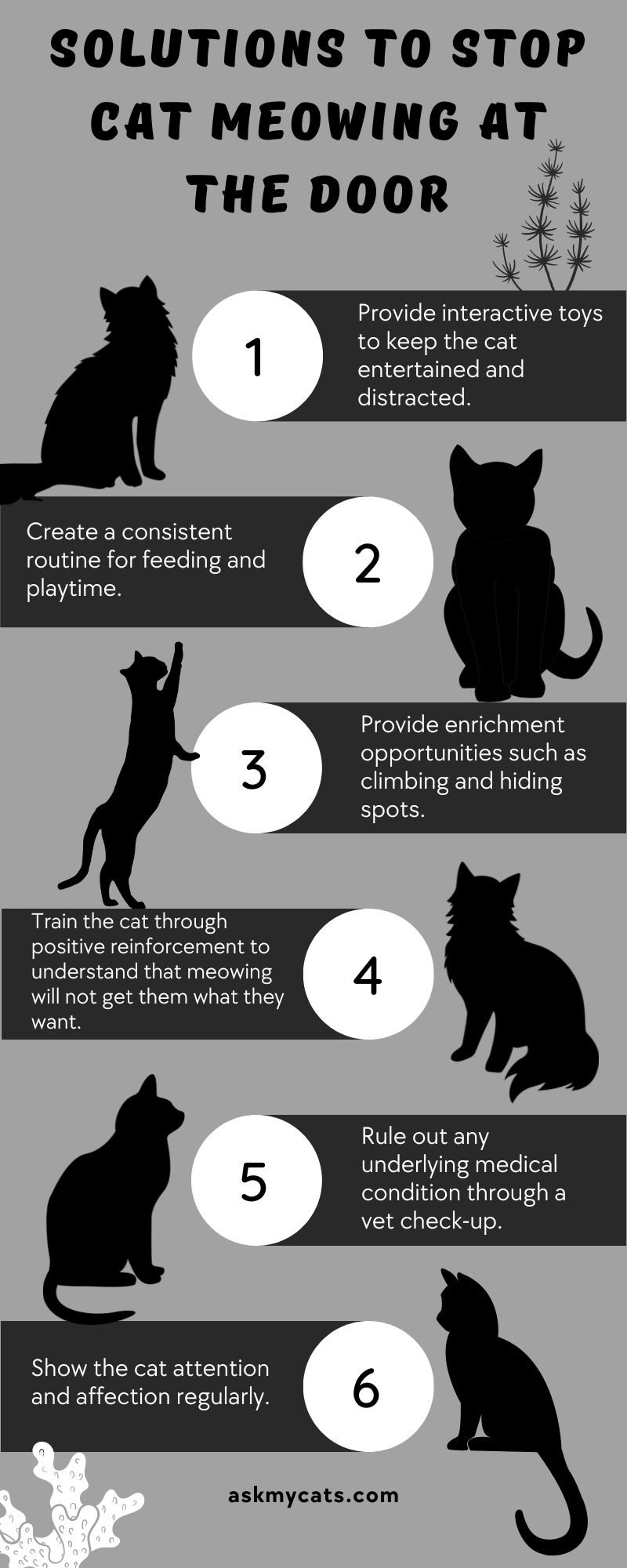Are you tired of being woken up in the middle of the night by your furry feline’s persistent meowing at the door?
You’re not alone! Many cat owners struggle with understanding why their cats engage in this behavior and what they can do to stop it.
Whether it’s a subtle meow or an all-out yowl, your cat’s door meowing can drive you crazy, and it’s important to understand why they’re doing it.
In this article, we’ll take a closer look at some of the common reasons behind cats meowing at the door, and provide some tips and tricks on how to address this behavior, so you and your kitty can get some much-needed peace and quiet.
Key Takeaways
- Indoor cats may meow at the door for various reasons, such as:
- Having a medical condition
- Wanting to be let outside
- Missing someone
- Wanting food
- Being bored
- Greeting people
- Searching for a mate
- Being curious
- Owners should check for underlying medical conditions and make sure the cat has access to essential items, such as water bowls and litter trays.
- Rehomed cats may meow at the door in an attempt to call their previous owners back.
- Boredom can also be a cause for indoor cats meowing at the door, as they may want social interaction or stimulation.


Give Your Cat the Perfect Day
Get the Free Ebook!
8 Reasons Why Indoor Cat Keeps Meowing At Door?
The reasons behind the meowing of an indoor cat at the door could be They are having a medical condition, wants to be let outside, missing someone, want food, boredom, greeting people, in a quest to find a mate, or are curious.

Let us discuss all these reasons in detail: –
1. Medical Condition
The foremost thing that you need to do if your cat is meowing continuously at the door is to ensure that there aren’t any underlying medical conditions causing this.
Sometimes having to experience discomfort or pain, cats tend to meow continuously to let their owners know that something is not right with them.
In this case, a vet needs to examine the cat as soon as possible as it could be in severe discomfort.
2. Wanting To Be Let Outside
If you and your cat are on the same side of the door and they keep meowing at it, it might be an indication, that they are trying to let you know that they want to be allowed outside. Sometimes they might even scratch the door if the desire is too strong.
For instance, if they keep meowing at the back door, they might want to go out to play in the garden, or they might see something there that they want to investigate further.
On the contrary, if they are in the same room as you, they might be meowing at the door to tell you that they need to go outside as they want to use their litter tray or want to play with their favorite toy.
This is the reason why you should always let your cat access their daily essentials like water bowls, litter trays, and toys.
Expert Quote
“Meowing at the door is a common behavior in cats and can be an indication that they want to go outside or have some sort of need that is not being met.”
Dr. Karen Becker, veterinarian and animal behaviorist
3. Missing Someone
If your cat is rehomed, it might be meowing at the door in an attempt to call its previous owners back. This is quite common as cats seem to develop a strong bond with their owners, and rehoming them could lead to excess meowing in hopes of getting their owners back.
However, this should not last for more than a week as your cat will slowly learn to adapt to its new surrounding.
Your cat could also be missing someone who is not currently in the house. For example, children who went to school or spouses who left for work. If this is the case, the meowing should stop once they return.
Also, check out why does my cat cry when i leave the room
4. Wanting Food
Your cat may be meowing at the door because it wants to be fed if you and your cat are on opposite sides of a closed door in your home.
They’re pleading with you to “feed me, please human!” via the door. Your cat is most likely after breakfast if they are meowing and waiting outside your bedroom door every morning.
You may also tell whether your cat is trying to express this by the fact that they will not attempt to enter when you open the door.
Instead, they’ll flee once more, heading for their food station. Cats will always want to communicate with you, so follow them and observe where they’re going, and you’ll probably get the answer.
You might also like to check out why won’t my cat shut up
5. Boredom
Cats, like humans, become bored fast and require a lot of stimulating stimuli to stay happy and interested. It’s possible that your cat is bored if they keep meowing at the door.
They could want you to play with them or pay special attention to them, and they won’t stop meowing until you give them something to do.
Boredom is a very likely cause for anyone with an indoor cat meowing at the door. Cats are naturally independent creatures who enjoy wandering and exploring the outdoors.
On the other hand, indoor cats can be perfectly satisfied to spend their entire lives indoors, but they require more enrichment and a greater variety of toys and activities than outdoor cats.
Expert Quote
“Meowing at the door could be a sign that your cat is seeking social interaction, or it could be a sign of an underlying behavioral or medical issue.”
Dr. Elisa Mazzaferro, veterinarian and animal behaviorist
6. To Greet People
Another reason why your cat is meowing at the door could be that it wants to greet someone. Cats are relatively independent creatures, and if they are specially meowing to welcome you, you should feel flattered.
When you come home from work, your cat may greet you, or if your cat meows at your bedroom door in the morning, it may be just waking you up to wish you a good morning.
Some cats tend to their owners up by meowing right outside their room at the start of each morning, which could be cute and fun initially but becomes quite annoying quite fast.
However, your cat does not want to bother you. It just wants to be the first one to wish you a happy morning.
They’re looking forward to the day ahead and have been missing you all night. Plus, they’re undoubtedly looking forward to their breakfast!
7. Quest For A Mate
The majority of you must have already got your cat neutered, as it is only logical to do so. However, if some of you haven’t done so for whatever reason, your cat may be meowing the door because of this as they want to go outside to look for a mate as they are still reproductively intact.
Males will meow at you, pleading to be allowed outside so that they can approach these females. Male cats will be able to sniff intense sex pheromones released by cats in heat from miles away.
If there is a female in heat nearby, they are immediately drawn to this smell and can be rather persistent in getting outside.
On the other hand, female cats in heat will meow at the door to signal to nearby males that they are ready to breed and are looking for an active mate.
If your female cat is in heat, she will begin rubbing her body against you and other items in your home excessively, and she will become much more friendly.
8. Curiosity
Cats are curious creatures who enjoy exploring their surroundings. And there’s nothing like a locked door that you don’t know what’s behind to pique your interest.
Your cat may be meowing at the door they’ve never been allowed out of before because they’re inquisitive about what’s behind it.
This could be a room in your house that you’ve locked them out of or a curious indoor cat meowing at the door leading outside.
If they can hear and smell new people within a room they spend a lot of time in; they can be inquisitive. They’re curious about what’s going on.
All these reasons could be why your indoor cat is meowing at the door.
Study Alert
According to a survey conducted by the American Association of Feline Practitioners (AAFP), the most common behavioral problem reported by cat owners is excessive vocalization, with 35% of owners reporting this issue.
According to the same survey, common reasons for cats meowing excessively include seeking attention or demanding food, marking their territory, or expressing pain or discomfort.
American Association of Feline Practitioners (AAFP)
You might also like to read about why stray cat meowing loudly at night
Why Does Stray Cat Meow At My Door?
A stray cat can meow at your door for various reasons, including Hunger, pain, the weather outside, or it being pregnant.

Let us try and understand their reasons for meowing deeply: –
1. Hunger
A stray cat’s life is complicated and unpredictable. Hunger is one of the harsh realities that stray cats must deal with on a day-to-day basis.
Food is scarce for these tenacious little mammals, who typically live by rummaging through restaurant dumpsters or hunting mice and insects.
A stray cat weeping in front of your door may be communicating with you that she is starving and wants to enter your residence. In essence, weeping might have been a plea for assistance from the poor cat that she needs some food.
2. Pain
Staying outside exposes feral cats to various risky and unforeseen scenarios, ranging from being driven over by fast-moving vehicles to ongoing violent encounters with several other animals.
By meowing at your door, a stray cat could be expressing to you that it is in pain or discomfort and requires immediate medical attention.
In this scenario, if you’re feeling safe, approach the cat carefully and softly. Hold out your hand and softly call it. If feasible, provide a can of tuna or cat food, a bowl of water, and shelter.
But don’t push it. Once the cat becomes friendly, try to find the cause of its discomfort or approach the vet.
3. Bad Weather
Although basking in the lovely April sunlight could seem great as well as delightful in spring, stray cats must find the means to endure the harsh winter as well as other unforeseen weather in December and January, particularly in colder places.
Even when the cat acquires a dense winter coat, surviving the freezing evenings can be difficult and could prove to be fatal.
A stray cat may be informing you that she might be cold and wants to share your comfort and warmth by meowing loudly in front of your house.
Always try to help them if you can by sheltering them. If providing shelter is not possible, try to give spare blankets so that they could remain warm.
4. Pregnancy
Another important source of stress inside a homeless cat’s lifespan is the cycle of pregnancy and litters of adorable but defenseless kittens.
The majority of stray and feral cats are not sterilized or neutered, and stray female cats’ daily lives are often filled with the trials of pregnancy and delivering litter after litter of progeny.
If you notice a stray cat wailing outdoors, she could be reaching out to a kitten she can’t seem to find, possibly because he had been taken away or because of some horrific event that took place.
Find out why neighbours cat meowing at my door
How to Determine the Reason for Your Cat’s Meowing At Door
So, you’ve been hearing a lot of meowing coming from your cat at the door. It’s not a pleasant sound, and it’s not something you’re used to hearing.
Expert Quote
“When a cat meows at the door, it is important to pay attention and try to determine the underlying cause. It could be something as simple as wanting to go outside or as complex as a medical issue.”
Dr. Rebecca Greenstein, veterinarian and animal behaviorist
But don’t worry, there are ways to figure out why your cat is doing this.
1. Observe your cat’s behavior and patterns
First things first, take a step back and observe your cat’s behavior. What are they doing when they meow?
Are they sitting in front of the door, scratching at it, or pacing back and forth? Write it all down, so you have a clear picture of what’s going on.
Are there any specific times of the day or night when your cat does this more frequently?
Are there any external factors that might be contributing to the behavior, such as new construction or loud noises outside?
2. Rule out obvious needs such as food and litter box
Before you jump to any conclusions, make sure you’re taking care of your cat’s basic needs.
Are they hungry? Do they need to use the litter box? Sometimes, a cat’s meowing can be a simple plea for food or a clean litter box.
And if your cat is well-fed and their litter box is clean, great! You can rule out those possibilities and move on to other potential reasons for the meowing.
3. Consult with a veterinarian
If you’ve ruled out the basics and your cat’s meowing persists, it might be time to schedule a visit with your vet.
They can take a look at your cat and rule out any underlying medical conditions that might be causing the behavior.
Your veterinarian can also provide you with some advice and guidance on how to address the issue based on your cat’s individual needs. So don’t hesitate to reach out to them if you’re unsure about what to do next.
Important Note
It’s important to remember that every cat is different, so what works for one cat may not work for another.
But by observing your cat’s behavior, ruling out obvious needs, and consulting with a vet if necessary, you’ll be well on your way to understanding why your cat is meowing at the door – and how to put a stop to it.
Also, check out why my cat wait outside my bedroom door
How to Stop Cat From Meowing At Door?
Once you’ve figured out why your cat is meowing at the door, it’s time to take action! Here are a few things you can try to stop the meowing and keep your kitty happy and content.
1. Providing attention and affection
Providing attention and affection can go a long way in satisfying your cat’s need for attention.
Cats are social creatures and thrive on interaction with their owners. Take some time to play with your cat, give them some cuddles, and show them some love.
This will help curb their desire to meow at the door for attention.
OUR Recommendation
Keep your cat entertained and mentally stimulated with our interactive cat toy! Check out our recommended cat interactive toy.
The PetSafe Peek-a-Bird Electronic Cat Toy
2. Implementing a consistent feeding and litter box routine
Another important step is implementing a consistent feeding and litter box routine.
Keeping a regular schedule will help your cat feel more secure and reduce the likelihood of them meowing at the door.
3. Training and behavior modification
In some cases, training and behavior modification may also be helpful.
Teaching your cat to associate different cues (like a bell ring or a clicker sound) with rewards can help them understand when it’s appropriate to meow and when it’s not.
4. Addressing underlying health or behavioral issues
If you suspect that an underlying health or behavioral issue is contributing to your cat’s meowing, it’s important to address it.
Consult with your vet to rule out any medical issues and consider seeking out the help of a certified cat behaviorist if needed.
5. Additional Solutions for Door Meowing
| Solution | Description |
|---|---|
| Deterrents | Try using deterrents such as double-sided tape or motion-activated sprays to discourage your cat from meowing at the door. |
| Pheromone sprays | Use pheromone sprays or diffusers to create a calming environment for your cat and reduce their stress levels, which can lead to meowing. |
| Sound machine | Play soothing sounds or white noise through a sound machine to help mask any outside noise that may be triggering your cat’s meowing. |
Also, check out the reasons behind i just adopted a cat and it won’t stop meowing
Strategies for Reducing Door Meowing
| Strategy | Description |
|---|---|
| Ignore it | Cats may meow at the door to get attention, so ignoring the meowing can help reduce it over time. |
| Distract them | Provide your cat with interactive toys, scratching posts, or other distractions to redirect their attention from the door. |
| Block their view | Covering the door or windows with a curtain or blinds can prevent your cat from seeing outside and meowing at other cats or squirrels. |
| Provide a sanctuary | Create a cozy and comfortable space for your cat to relax in, such as a cat tree or bed near a window, to reduce their desire to be near the door. |
| Training | Teaching your cat to understand “quiet” commands or training them with a clicker to stop meowing at the door can be useful. |
Frequently Asked Question
Should I scold my cat for meowing at the door?
Ans. No, scolding your cat for meowing at the door is never a good idea. Sure it can work for a short period of time, but your cat is meowing at the door for a reason, and by scolding them, you are not dealing with the issue, just putting it under the rug.
Should I let the stray cat in if it is meowing at my door?
Ans. You could let a stray cat in if it is meowing at your door. However, make sure that it is safe to do so as feral cats could be pretty aggressive.
Should I give my cat sedatives to stop her meowing?
Ans. No, giving sedatives to your cat to stop her meowing will not fix the issue; it will just delay it for some time. So, it is better to find the root of her meowing if you want to stop it.
Final Words

Having your cat meow at the door could be a rather annoying issue, but you try to keep your patience, as your little friend is just trying to communicate with you.
Try to find the root cause of their meowing and fix it accordingly.
Keep in mind that some cats are more vocal than others. If you have a chatty cat, learn to appreciate and love them for who they are.
